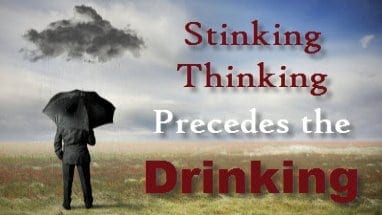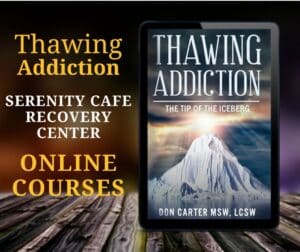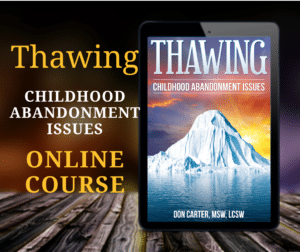
Stinking Thinking Before the Drinking
Stinking Thinking Precedes the Drinking

Questions? Contact Angie at Carter Counseling
Back in my drinking days, the relationship I had with alcohol was made up of three components.
- First, I had a genetic predisposition to alcoholism, which meant because it was prevalent in my family I was 4 to 5 times more likely to develop an addiction to alcohol if I chose to drink.
- Secondly, there was a spiritual component which is sometimes referred to as a ‘spiritual malady’ or a soul sickness. It has been described as a type of loneliness or emptiness that cannot be alleviated by outside remedies – a hole in the soul, so to speak.
- The third component of this relationship with alcohol is the thought process that accompanies the drinking, often described as ‘alcoholic or addictive thinking’. Many times people with drinking problems have thinking patterns and processes that are strikingly similar.
I am currently in long-term recovery which means I haven’t had a drink in 15 years, but prior to this period of sobriety, I made various attempts at cutting down or cutting back. I was sure that I could manage it if I just put my mind to it and summoned up enough willpower. I seem to have various traits in other areas of my life that allowed me to believe this. Determination, perseverance, creativity and a little bit of stubbornness thrown into the mix usually availed me what I was after! But this was not to be the case when trying to control my drinking.
My first real attempt came after getting into a physical altercation with a cousin. I was horrified at my behavior and very ashamed of what happened. I made a vow right then and there to not drink again. My cousin was very hurt and upset with me. I continued with all my same routines, hanging out with drinking family and friends, playing pool and going to parties but I did not drink. Slowly over time my cousin forgave me, it took five weeks.
After being absolved for my behavior I again relied on stinking thinking and came to the conclusion that the problem was my anger, not the drinking. Armed with those thoughts I set out to drink again and work on not getting angry! I spent the next several years trying to master that art, which I failed at on numerous occasions. But once again, I would go back into a drinking episode thinking “this time it will be different.” A good definition of insanity is ‘without good sound judgment.’ This was definitely proving to be the case in my situation.
There are several types of stinking thinking patterns that accompany abusive or addictive drinking. These characteristics can make up a wall of denial that enables a drinker to continue despite the problems that are occurring. Denial is different than lying. When someone lies, they know they are not telling the truth, denial is the inability to see things as they actually are.

Stinking Thinking Patterns
Here are some common types of distorted thinking that support the denial of problematic drinking:
- Rationalizing – using excuses or justifications for our drinking. “I’ve had a bad day”, “I deserve to drink, I work hard all week”, “It helps me sleep”, “I can’t have any fun if I don’t drink.”
- Minimizing – making our drinking seem less serious than it is. “Everybody drinks, and I’m not that bad.” “I only drink on the weekends.” “I only drink beer.”
- Diversion – changing the subject, evading or dodging, debating or arguing, or using humor to avoid and/or deflect.
- Disarming – “this is just the way I am.” “I drank when you met me and you’re not going to try and change me.”
- Hostility and anger – using intimidation and threats to keep people from talking about the drinking issue.
- Blaming – the cause of the drinking is caused by something or someone else. “If my spouse wasn’t such a nag” “I wouldn’t drink so much if I didn’t have back luck/an unfair boss/financial problems/out of control children/unemployment/loneliness/health problems etc…”
The biological component of addiction to alcohol is located in the reward pathway of the brain which makes it very powerful and this can override or alter the thinking – resulting in stinking thinking. I would decide to quit and then could not follow through with that decision. Each time I went back to drinking I believed it was because I had changed my mind, I had no idea I was powerless.
When a person who is addicted to alcohol first starts drinking it is a choice, but after a period of time and certain changes start to take place in the brain we can lose the power to choose. Denial and stinking thinking begin to develop in order to support and continue the compulsion to drink. It also leads to relapse once we do get clean and sober. Awareness and education about this type of thinking can be instrumental in breaking through some of the obstacles of getting help.
About the Author
Angie Carter, CRADC, SAP is a certified alcohol and drug counselor in the State of Missouri and DOT certified Substance Abuse Professional. She is in private practice with her husband at Carter Counseling and Consulting Services in Central Missouri. Angie primarily sees clients in the office but is also available for telephone coaching and/or consultation. Click here to contact Angie with your questions or feedback.





